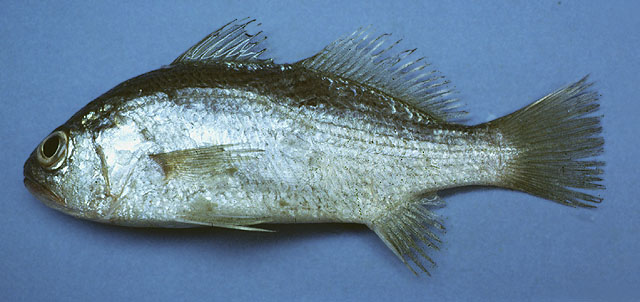| Sciaenidae (Drums or croakers) |
| 26 cm TL (male/unsexed) |
|
demersal; marine; depth range - 35 m |
| Western Atlantic: eastern Florida (USA), throughout the Antilles and along the Caribbean coast from the Bay of Campeche (Mexico) to Guianas. |
|
Dorsal spines (total): 11-11; Dorsal soft rays (total): 21-24; Anal spines: 2-2; Anal soft rays: 7-8. Colour grey or greyish blue on back, silvery below. Sides with faint streaks, oblique above and longitudinal below lateral line. Fins pale, yellowish, dusted with dark spots. A faint dark spot at pectoral-fin origin. Mouth moderate in size, slightly oblique, terminal. Preopercular margin thin, nearly smooth. Anal fin second spine moderately strong, less than 2/3 the length of first soft ray. Gas bladder with 2 chambers; anterior one yoke-shaped, without appendages on posterior margin, posterior one carrot-shaped. Lapillus (small earstone) enlarged, more than half the size of sagitta (Ref 51721). |
| Common over muddy and sandy bottoms in inshore waters. Juveniles are also found in rocky areas. Feeds mainly on shrimps. Seldom marketed as a food fish; mostly used as bait (Ref. 3702). |
|
Least Concern (LC); Date assessed: 03 October 2019 Ref. (130435)
|
| harmless |
|
Source and more info: www.fishbase.org. For personal, classroom, and other internal use only. Not for publication.

